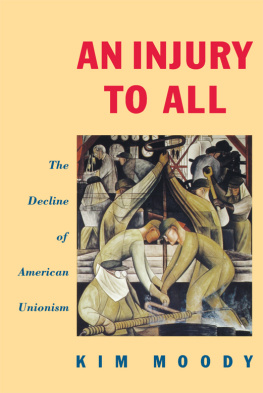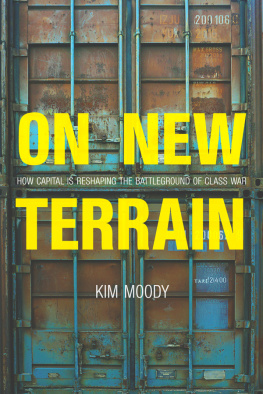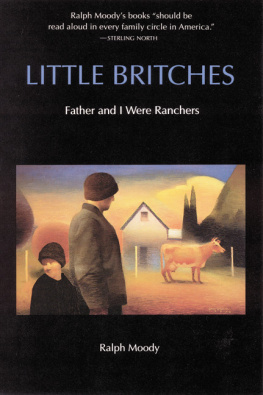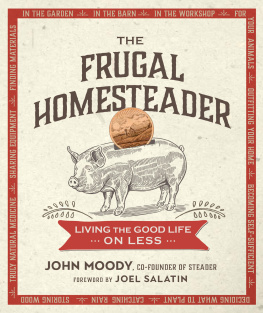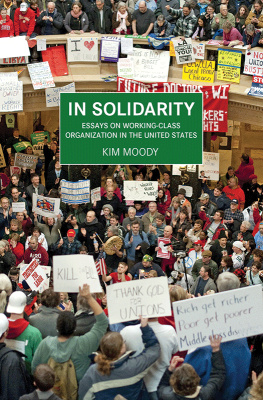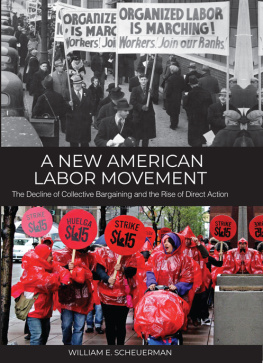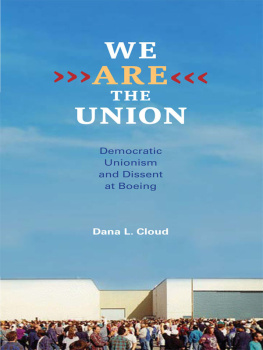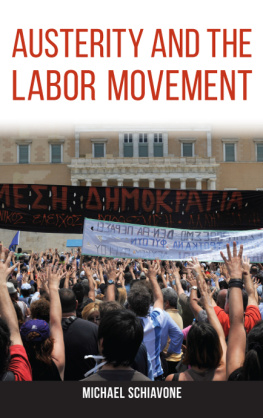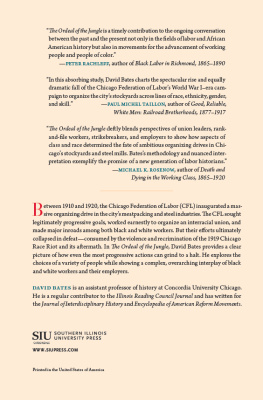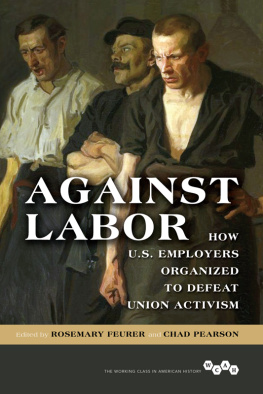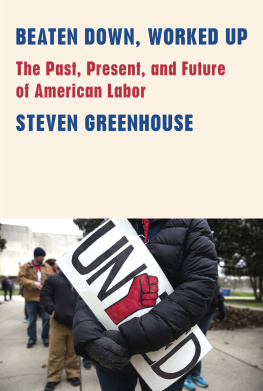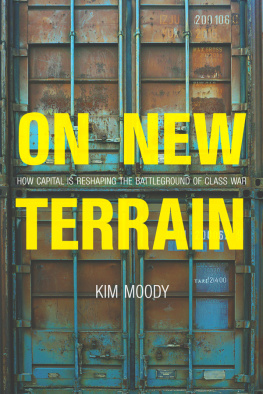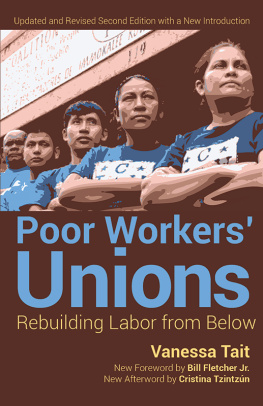An injury to all: the decline of American unionism. (Haymarket).
1. United States. Employment. Labour, history
I. Title II. Series
Moody, Kim.
An injury to all.
Bibliography: p.
Includes index.
1. Trade-unions--United States--History--20th century. I. Title.
Like most books, this one is the result of the efforts of many people, one of whom was lucky enough to put it on paper and get most of the credit. Many of the people whose energy and work went into this book did so involuntarily, simply by doing research and publishing their results. They are credited in the notes or in the text itself. Others contributed to this book by virtue of the role they played in the various events and struggles described herein. I single out the fighters from Austin, Minnesota, and Watsonville, California, in the dedication to this volume, but their numbers are legion. I have been fortunate, largely in my role as a journalist at Labor Notes, but also as an activist in the labor and socialist movements over the years, to meet some of these contributors. What I have learned from them, no matter how brief the personal encounter, is completely interwoven with the assumptions and opinions I hold about organized workers in the United States and around the world.
Ultimately, however, there are those with whom I have had a closer collaborative relationship over time and/or those whose ideas have shaped the thinking that has gone into this book. In the first ranks of these would be the Labor Notes staff: Phill Kwik, Jane Slaughter, and Jim Woodward. A glance at the notes for the chapters dealing with recent events will give the reader a hint of how dependent I have been on the consistent reporting and analysis in Labor Notes of the trends of the past eight years. But the interaction with my fellow Labor Notes staff members has gone far beyond the acknowledgements in the newsletter or in my notes. Although not everyone on the staff would necessarily agree with everything in this book, it is, in my mind, a product of the Labor Notes experience.
Another special group of people who dedicated their efforts and, in many cases, lives to the advancement of organized labor and the working class were the many fighters, thinkers, and organizers who passed through the International Socialists (IS) from the late 1960s through the early 1980s. The IS experience was unique on the American political left, in my opinion, because of the depth and consistency of its commitment to the day-to-day struggles of the organized working class. It did not succeed any more than any other socialist group in building a genuine working-class-based socialist movement in the United States, but the richness of its interaction with the reality of class struggle and working-class life deserves at least a footnote in the history of the American working class. I could not possibly understand the workings of this economic system, of the trade unions, of the oppression of women and national minorities, or working-class life in America without having gone through that experience.
There are also people who deserve special mention for the influence they have had on my thinking about the subject of this book, even though some of them fall within one or another of these general categories. Among them are Steve Early, Suzanne Gordon, Mike Parker, Bill Parker, Wendy Thompson, David Finkel, Pete Kelly, Ilene Winkler, Don Bacheller, Tony Mazzocchi, Les Leopold, Anne Bastian, Sid Lens, Ken Paff, Steve Kindred, Pete Rachleff, Roger Horowitz, Mike Davis, Nelson Lichtenstein, Ray Rogers, Ed Allen, and Stan Weir.
Of course, having some ideas and writing a book are two different things. A very special acknowledgement, therefore, goes to the person who, chapter by chapter, edited, suggested, encouraged, and generally created order out of chaos in the most tactful and patient manner imaginable: Barbara Koeppel.
In November 1986, as part of the celebration of the centenary of the founding of the American Federation of Labor, the Smithsonian Institution sponsored a two-day conference on work, technology and culture in industrial America. The discussion among a group of noted labor scholars centered primarily on the conflict between the values of collectivism and individualism in American culture and in the US labor movement. Historian Alice Kessler-Harris noted that two competing ideas have run through the labor movement, as they have run through the American past. The first is the notion of community the sense that liberty is nurtured in an informal political environment where the voluntary and collective enterprise of people with common interests contributes to the solution of problems.
Kessler-Harris cited town meetings and movements for social change as examples of collectivist activity in US history, arguing that the collective impulse lends itself to egalitarian values in that all citizens are deemed equal in their capacity to participate in democratic decisionmaking processes.
On the other hand, American culture and history have also been characterized by a strong belief in individualism. In this discussion, individualism is used in a specific way. It does not mean the dignity of the individual per se, any more than collectivism means some Orwellian barracks society. Kessler-Harris described American individualism in its specific historical form:
The second idea is that of individualism a belief in the hard work and ingenuity characteristic of our Puritan forebears and of legendary frontiersmen and women; and faith in the capacity of people to rise by their own wills to the highest vistas of the American dream. Embodied in the notion of free labor, the ideal assured the dignity of honest toil and posited that its results would be economic success.
Perhaps the most obvious feature of the notion that honest toil assures economic success is its utter falsehood. American economic history, like that of all nations, demonstrates that wealth has not gone to the producers, but to the drones, the liars, and the ruthless. From the Robber Barons of the late nineteenth century to todays inside traders, the fruits of society have accrued to those who already hold wealth and power or to those unscrupulous enough to take it. Even the apparently honest businessman accumulates wealth through the exploitation of the labor of others. Acting as an individual, the honest worker typically gets what the employer is willing to give, which sustains a life-style considerably below the highest vistas of the American dream.

